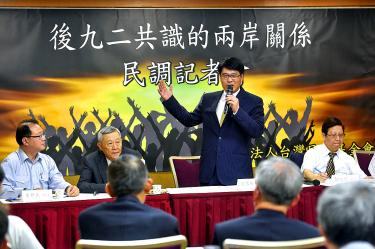The percentage of people identifying themselves as “Taiwanese” has reached a record high, according to a poll released yesterday by the Taiwanese Public Opinion Foundation.
More than 80 percent of respondents self-identified as Taiwanese, compared with 8.1 percent who identified themselves as Chinese and 7.6 percent who identified as both in the poll, whose wording asked respondents if they viewed themselves as “Taiwanese,” “Chinese” or had “other thoughts.”
When asked to choose between eventual independence and reunification with China, more than 51 percent said they favored independence, while 15 percent favored reunification and 25 percent favored maintaining the “status quo.”
“The results represent a historic peak for identification as Taiwanese and show that it has decisively replaced identification as Chinese as Taiwan’s mainstream ethnic identification,” foundation chairman You Ying-lung (游盈隆) said, attributing respondents’ relatively high support for independence to the poll’s focus on an eventual future rather than the immediate choice used in many surveys.
Chao Chun-shan (趙春山), a prominent pan-blue academic and professor in the Institute of China Studies at Tamkang University, said the result demonstrated the continued failure of Chinese overtures to halt increasing support for independence.
“China’s strategic objective has not changed, but as Taiwan’s democracy has developed, [Beijing] has come to realize that it has to move from placing its hope in the Chinese Nationalist Party (KMT) to placing its hope in Taiwanese,” Chao said. “However, the results of eight years of cross-straits exchanges [under former president Ma Ying-jeou (馬英九)] have not exerted the influence necessary to prevent the mainland’s [China’s] fears from being realized as more Taiwanese have come to advocate independence, while fewer favor reunification.”
While maintaining dialogue over education and culture, China will likely move to “differentiate” policies benefiting Taiwanese to target people with receptive attitudes, he said, adding that there are already moves to sanction businesspeople who favor independence.
The poll showed that 70 percent of respondents approved of President Tsai Ing-wen’s (蔡英文) government appointments and handling of major national affairs less than one week after taking office, with 56 percent favoring her Democratic Progress Party (DPP) compared with 21.5 percent favoring the KMT.
Tsai’s approval rating carried over to her inaugural address, with almost 70 percent of respondents approving her refusal to agree to Chinese demands to acknowledge the so-called “1992 consensus.”
The “1992 consensus,” a term former Mainland Affairs Council chairman Su Chi (蘇起) admitted making up in 2000, refers to a tacit understanding between the KMT and the Chinese government that both sides of the Strait acknowledge there is “one China,” with each side having its own interpretation of what “China” means.
While 80 percent said they did not want to see cross-straits relations regress, more than 52 percent said they would blame China — not Tsai — if it cuts off cross-straits negotiations in response to her refusal to acknowledge the “1992 consensus.”
While the DPP’s approval ratings represented a historic high, Tsai’s approval ratings were similar to those Ma had shortly after he took office in 2008 and likely reflected a “honeymoon period,” You said.
Shih Hsin University professor Peng Huai-en (彭懷恩) said that while there appeared to be some shift in the political landscape, the effect was clouded by a “social desirability” bias, which he said often creates a temporary spike in polling numbers for election winners.
“People like to add icing to the cake,” he said. “The KMT is not going to be knocked out any time soon.”
The survey interviewed 1,089 respondents using random digit dialing and had a margin of error of 2.97 percentage points.
Source: Taipei Times - 2016/05/28





















